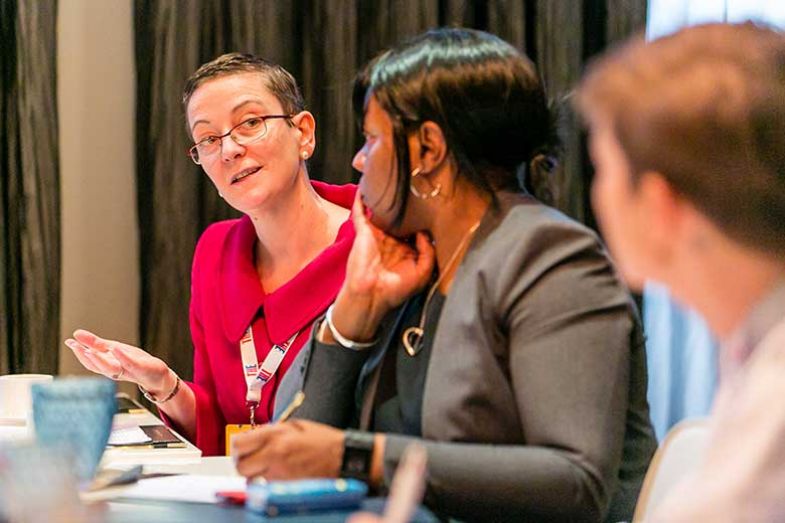
A Times Higher Education and HSBC UK roundtable examined policies and programmes that could improve representation
The inaugural THE Live event brought together delegates from across the higher education sector to celebrate groundbreaking approaches to teaching and learning, new technology and university leadership.
Among the thought-leadership sessions was a roundtable organised by Times Higher Education in partnership with HSBC UK that asked: “What action do we need to take to ensure that every voice is represented at a senior level?”. The discussion was co-chaired by Sara Custer, THE‘s digital editor, and Fiona Daniel, head of diversity and inclusion
at HSBC UK.
Ms Daniel began by saying that students were asking “How can I make sure that, when I’m selecting where I want to go [to university], the people who are teaching me look like me?” or are like them in some way, in the same way that employees in businesses want to look up, see themselves and aspire to be the next CEO. She added that there is strong research evidence that a diverse workforce also has “a big impact on the bottom line”.
The group began the discussion by recognising the “leaky pipeline” of black, Asian and minority ethnic students into academia and leadership in higher education. Stephanie Marshall, interim vice-principal at Queen Mary University of London, explained that her institution has 66 per cent BAME students but that “students say, ‘whenever we have alumni coming in to talk to us about jobs, they are always white, pale, male, ageing and boring’.” She outlined a “range of interventions” within QMUL’s equality, diversity and inclusion strategy, such as the implications of the Aurora programme for developing female leaders in higher education.
Ian Campbell, deputy vice-chancellor of the University of Hertfordshire, described structural changes made by his institution, such as adding articles from African journals to reading lists in order to reflect the diversity of its students and holding workshops that promote the commitment to diversity in its recruitment processes.
Sarah Barrow, pro vice-chancellor and equality and diversity committee chair at the University of East Anglia, added to the examples of curriculum change by citing a well-attended Black History Month event at UEA, as well as a number of targeted student recruitment drives.
Ms Custer asked if too much was expected of applicants for leadership roles. Harriet Dunbar-Morris, dean of learning and teaching at the University of Portsmouth, noted that a recent report from the female leadership organisation, Women Count, identified “a professorial roadblock” when it came to dean and head of school positions.
Zoe Radnor, vice-president of strategy and planning at City University, London, added that “the whole notion of academia and higher education has changed. I don’t think that the skills we’re asking for and the roles we’re asking for are the same. There need to be far clearer career pathways that are seen as of equal status.”
The roundtable then discussed best practice for recruitment. There was general agreement about the merits of blind applications, quotas and mandatory feedback to candidates, with a caveat on quotas coming from Ms Daniel, who said: “Don’t let ticking boxes make you lose sight of being really inclusive overall. Put yourself in the candidate’s shoes – they want to know that they have got the role on merit.”
Kiran Trehan, professor of leadership and enterprise development at the University of Birmingham, agreed, saying that “a decade of quotas hasn’t made a difference. They have become part of compliance and that doesn’t change the culture.”
However, Professor Marshall recalled female quotas on panels making a difference and cited an example from Norway, where 20 per cent of quality assurance bodies have to be students. “It has changed the culture, so maybe you have to force the hand of certain institutions,” she said.
There was an exchange about the wider context of higher education leadership roles and the attraction of senior jobs within the sector, given the pressures on leaders regarding funding, salaries and getting the balance right on partnering with business. This led to a discussion about appointees being perceived as a token role model for change and the discomfort around that.
Ms Daniel said that no one signs up to be a role model and that it can also bring additional pressure. Individuals do not want to be a poster child for a particular minority group, or to be seen as the appointee who knows all that there is to know about that group.
After an acknowledgement that the emphasis for diversity is on the next generation of leaders, Dr Dunbar-Morris provided examples from the “students as partners” approach at Portsmouth.
“Our vice-chairman of education and democracy set up a BAME network in the students’ union and recently held a Women as Leaders event to encourage female students to speak up, to become course reps and sabbatical officers. We’re bringing in the students who go on to be potential leaders,” she said.
Vanessa Ho, associate dean for equality, diversity and inclusion at St George’s, University of London, noted that networks tend to “split people into groups. They might be useful at the beginning of a journey but perhaps they should be based on specific things, rather than broader themes like gender and race?” she said.
Professor Trehan advocated the “natural networks” that can arise with “reverse networking” and “reverse mentoring”, where “people at different levels work on a particular issue on which they are trying to effect change, so the very people we have been talking about are doing the educating”.
Professor Marshall reinforced this by giving the example of Professor Uduak Archibong, now at the University of Bradford, who has encouraged senior university teams to mentor aspiring academics from ethnic minorities. “It was the senior team who had the greatest learning experience,” she said.
“Don’t do anything about us without us,” is how one student summarised policy change to Professor Campbell.
Ms Daniel summed up the session by saying that we have to “remember that inclusive inputs will give you inclusive outputs”.
The panel
Sara Custer digital editor, Times Higher Education (co-chair)
Fiona Daniel head of diversity and inclusion, HSBC UK (co-chair)
Sarah Barrow pro vice-chancellor and equality and diversity committee chair, University of East Anglia
Ian Campbell deputy vice-chancellor, University of Hertfordshire
Philippe De Wilde deputy vice-chancellor, University of Kent
Harriet Dunbar-Morris dean of learning and teaching, University of Portsmouth
Vanessa Ho associate dean for equality diversity and inclusion, St George’s, University of London
Joe Marshall chief executive, National Centre for Universities and Business
Stephanie Marshall interim vice-principal, Queen Mary University of London
Zoe Radnor vice-president, strategy and planning, City, University of London
Kiran Trehan professor of leadership and enterprise development, University of Birmingham
Suzy Verma, head of public sector and education, HSBC UK
Brought to you in conjunction with HSBC UK. Find out more about HSBC UK’s education team.
Join the THE Live mailing list here for all the latest THE Live news and exclusive offers.















